Setting Your Baby's Sleep Schedule when Starting Solids with @babysleepdr Aubrie DeBear, PsyD
- Why it's ideal to wait until your baby is closer to 6 months to start a sleep training program (...and how that overlaps with the exact time when you're starting solid foods too!)
- How the concept of “sleeping through the night” is a misconception. We as adults don't even sleep through the night...but when your baby does wake up, how you can help baby independently fall BACK to sleep so they don't need you to make this happen!
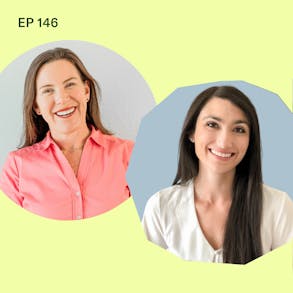
LISTEN TO THIS EPISODE
Episode Description
Should your baby be sleeping through the night before you start solid foods? And how does baby’s sleep schedule adjust when you begin feeding real food? Sleep is SO important for babies (...and by extension, their parents!) but what comes first: setting your baby’s sleep schedule or starting the transition to solid foods?
In this episode I’m joined by Aubrie DeBear from @babysleepdr. Aubrie is a sleep consultant with a doctorate in psychology and she’s answering all of your questions about setting your baby’s sleep schedule when making the transition to solid foods. There are so many myths about babies sleeping and starting solids and Aubrie is going to help put them to rest!
If you’ve ever wondered about how long to wait after feeding your baby before putting your baby to bed or what types of foods to avoid later in the day (or does it really matter), Aubrie is the sleep consultant you need in your life!
About the Guest
- Working currently with Ermshar & Associates, Specialized Psychological Services
- Received MA in Clinical Forensic Psychology (2014) and Doctoral Degree in Clinical Forensic Psychology (2016) from Alliant International University-Los Angeles
- Completed Pre-Doctoral internship at The Institute of Violence Abuse and Trauma and the Family Violence and Sexual Assault Institute where she received specialized clinical and forensic training in trauma-focused therapy and forensic assessments and evaluations for various court preceedings, as well as training in forensic interviewing with children.
- Specialized experience working in a domestic violence program through a women-and-children emergency shelter where she provided individuals and families with short-term therapy, safety planning, as well as parenting classes for mothers in crisis.
- Specialized training and experience conducting comprehensive neuropsychological and behavioral medicine evaluations
Links from this Episode
- Check out Aubrie DeBear, PsyD’s website where she has some great digital sleep guides for babies through age 3: https://www.babysleepdr.com/
- Get more sleep consulting information and tips on helping babies fall to sleep and stay asleep by following Aubrie on Instagram @babysleepdr
- Baby-Led Weaning with Katie Ferraro program with the 100 First Foods™ Daily Meal Plan, join here: https://babyledweaning.co/program
- Baby-Led Weaning for Beginners free online workshop with 100 First Foods™ list to all attendees, register here: https://babyledweaning.co/baby-led-weaning-for-beginners

Latest Episodes
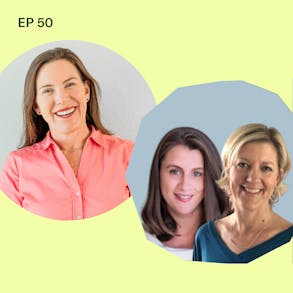
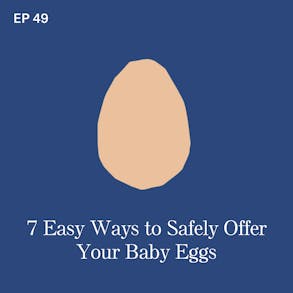

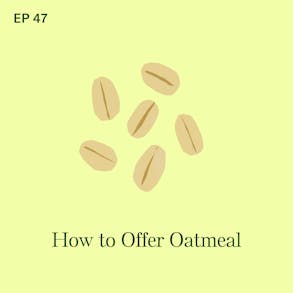
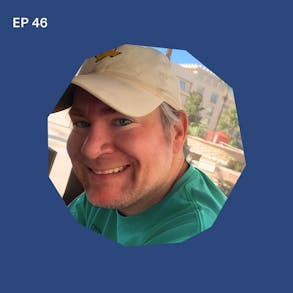
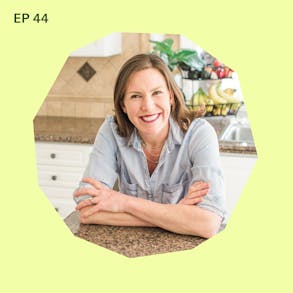
Aubrie DeBear (0s):
We're not expecting them to lay down and sleep for 12 hours without hearing a peep out of them. But when babies know how to sleep well, which is a task that they can learn to do, then when they come out of a sleep cycle on their own, they don't need your outside help to get back to sleep.
Katie Ferraro (15s):
Hey there! I'm Katie Ferraro, Registered Dietician, college nutrition professor, and mama of seven specializing in baby led weaning. Here on the Baby Led Weaning Made Easy Podcast, I help you strip out all of the noise and nonsense about feeding, leaving you with the competence and knowledge you need to give your baby a safe start to solid foods using baby led weaning. Hey guys, and welcome back! Today, I'm chatting with Aubrie DeBear and she's a Sleep Consultant, and we're going to be covering the topic of how to set your baby's sleep schedule when starting solids. Now, there are a lot of Sleep Consultants out there.
Katie Ferraro (55s):
I know you all have your favorites. I asked Aubrie to come on the podcast because of her background in psychology. She actually has a doctorate in psychology, which I think is very interesting. I actually interviewed a few other people before this episode. I am, before we selected on who we were going to interview for the episode about sleep consulting. And I was really taken aback by some of the myths that these so-called experts were perpetuating particularly about the link between sleep and diet. And I just think it is so important that we always consider the source. When we're seeking knowledge in an area outside our area of expertise, you should not be getting nutrition or feeding advices from a Sleep Consultant.
Katie Ferraro (1m 36s):
And I, as a Registered Dietician, specializing in baby led weaning, know nothing about sleep, which I learned a lot about sleep from my conversation with Aubrie. And thank you to many of the audience members, who sent questions ahead of this interview. I know sleep consulting and sleep training can be kind of controversial topics at times. But I think in this interview, you'll also appreciate that Aubrie did a really nice job of explaining some techniques that have worked for her as a mom of two, as well as for the multitude of families that she's worked with, but also acknowledging that all babies are different. All babies arrive at different milestones at different times, but I, for one, I always like to hear like, what are other people doing? What's working for other people. So with no further ado, I want to introduce you to Aubrie Debear.
Katie Ferraro (2m 19s):
She's on Instagram @BabySleepDr. And that's a Dr. for doctor. Aubrie's going to be talking all about some tips and techniques that we might use when trying to set our baby's sleep schedule, when we're also starting solid foods at the same time. Well, Hi Aubrey! Thank you so much for joining me today.
Aubrie DeBear (2m 35s):
Hi, thank you for having me.
Katie Ferraro (2m 36s):
All right. Give us a little background. What do you do as a Sleep Consultant? How did you get into this line of work?
Aubrie DeBear (2m 42s):
Sure. Well, as a Sleep Consultant, I work with families and parents to help their babies sleep well. I help educate parents on baby sleep needs and what babies are kind of capable of that we can help the whole family sleeps well. And my background before sleep consulting is actually in psychology. I'm a doctor of forensic and clinical psychology. So I've done lots of therapeutic work with families, children, adults. I've actually worked in the prison system. I've, I've seen a lot of stuff in my day. And then I became a mom. I have two little ones and my daughter was an okay, good enough sleeper. And I started to realize for myself that neither she nor I were our best selfs during the day when we weren't really sleeping while I wasn't the parent that I wanted to be, she was cranky and tired.
Aubrie DeBear (3m 31s):
And so around eight months old, when she was eight months, I learned about sleep training and just sleep consulting in general. And I sleep trained her. It was great. She became an awesome sleeper. She's four years old. She still sleeps great. And for me, the connection between mental health for parents and just children's wellbeing and sleep was just really eye-opening to me.
Katie Ferraro (3m 52s):
I love the messaging that you were not your best self, like I would say what a terrible person I am, if I don't have enough sleep or my children don't get enough sleep, but it's not like the it's like two days after they don't sleep enough. There's like a lag I've noticed at least with bigger kids. It's not the next day that you suffer. It's two days later. I'm like, why are they being terrible? Oh, two days ago everybody's sleep stuff was off. So it does affect you. And I like that you point out it does affect your mental health if we can't be our best self.
Aubrie DeBear (4m 16s):
Yeah. Yeah. So for me, with my psychology background, it really was impactful. I said, oh, this is more than just, I want my baby to sleep because I like sleep. It's, you know, I, we both need sleep to function and to be happy and healthy. And so I really started to look at it from that perspective. And then I went into an actual training program to become a Certified Sleep Consultant, and I've been doing it since then. I had my son, who is now two years old. And so I had a totally different experience with him with just knowing about sleep from the beginning and kind of working on things early on and seeing a total difference and just him always loving his crib and being a great sleeper. So I like to help families do that too.
Katie Ferraro (4m 55s):
We're here today to talk about setting your baby's sleep schedule when you're starting solids. But I want to, just before we get into like the foods specific stuff and my audience submitted some really great questions related to this. I wanted to ask you what age is most appropriate to begin sleep training? And then how should a mom or dad or caregiver prepare before beginning of sleep schedule? Like set the stage for us if you can.
Aubrie DeBear (5m 16s):
Okay, sure. So there's, you know, basically you don't sleep train before four months. Some people will do it a little bit later. Six months is kind of generally what people tend to agree on. Most pediatricians that I work with will say that four months is an okay time to start, but there's never, it's never too late. You just wouldn't start before four months old. And what you would do before starting is really to kind of look at your environment. Is it promoting sleep? What are some changes we can make to make sure that the environment ideal it's cool enough? It's dark enough. It's calming. It's quiet. And you want to get some basic understanding of babies's sleep needs, just education about it. What's awake window? Awake window is the amount of time that your baby should be awake depending on age and developmental needs.
Aubrie DeBear (5m 59s):
We don't want children to be overstimulated and overly tired because they probably won't sleep so well if that's the case. So knowing about tired cues, early tire cues versus late tired cues, if they're showing you late tired cues, you missed the timing and bedtime is going to be tough to handle. So knowing about sleep associations, you know, we want to teach babies how to kind of fall asleep independently over time when it's developmentally appropriate, that they can get back to sleep after a natural night waking in the night. So having this understanding about sleep and understanding routines can help you kind of get prepared to start any kind of sleep schedule.
Katie Ferraro (6m 35s):
It's so interesting that there's a lot of similarities between sleep consulting and starting solids with infant feeding. Like, you know, a lot of doctors will say four to six months, but four months is certainly too early to start solid foods. Six months is kind of the sweet spot you're talking about, you know, what's awake window in, what, what should they be able to do developmentally? Like how old is your baby and what feeding milestones should they be able to reach? And then, you know, sleep associations, how to fall asleep independently. That's very similar to, gosh, what's our goal here is to help our babies learn how to eat independently. So we're going to be working towards that goal, but I would assume it doesn't happen overnight. So about around what age could a parent or caregiver expect their baby to begin to, you know, this mystical magical sleep through the night thing, which we do that ?
Aubrie DeBear (7m 15s):
That's really hard to answer because as we say, all babies are different and sleeping through the night in itself is a misconception. None of us sleep through the night. None of us put our heads to the pillow and sleep and don't wake up until morning. Even adults, we have natural cycles of waking, but we can get back into a sleep cycle easily. You know, you might wake up to use the restroom or get a drink of water, just coming out of a sleep cycle, check your phone. What time is it? The same's for babies. We're not expecting them to lay down and sleep for 12 hours without hearing a peep out of them. But when babies know how to sleep well, which is a task that they can learn to do, then when they come out of a sleep cycle on their own, they don't need your outside help to get back to sleep and so, or need of feeding.
Aubrie DeBear (7m 56s):
So of course, newborns need to eat regularly through the night, right? So they're going to be waking up regularly, but as babies get older, the amount of feeds that they need in the night should decrease and should lesser. And so then also developmentally, they're able to go longer stretches. So we think that a night can happen as early as two to three months old. If they naturally wean their own night feeds, no one's asking you to take those feeds away from your baby in the night, but some babies will just naturally start sleeping longer stretches and parents wake up like, whoa, he didn't wake up last night. What's going on? That's awesome. Some babies around six months old, you know, after six months, if a baby is a healthy weight and there are no medical issues, if they're still waking for feeds in the night, it's probably more of a sleep association.
Aubrie DeBear (8m 37s):
And so we wanted to kind of look at what the baby's actually needing during those wakings.
Katie Ferraro (8m 42s):
What about breastfeeding moms? Because of course their feeding cycle is going to be a little bit different than if you're on a set bottle-feed for moms, who are still breastfeeding as they move into the six month mark, when they're going to be starting solid foods, how should they manage those night feedings while they're trying to do sleep training, and then also stressing about solid foods in the daytime, any tips for the breastfeeding moms?
Aubrie DeBear (9m 1s):
Well, so there's, I think a misconception that bottle fed or formula fed babies are going to sleep longer and better than breastfed babies. I've worked with plenty of breastfeeding moms, whose babies do sleep well and wean in their own night feeds. So however, if your baby's hungry, feed them, of course, when the night of your baby's waiting for a feed, you can still feed them. Even if you're sleep training, sleep training does not mean removing comfort, removing feeding. It does mean if your baby is not hungry, you don't need to respond with a feed just because they wake in the night. So that's part of what sleep training is about, is understanding your baby's actual needs and cues. I always say, you should check with your pediatrician and if your pediatrician says this baby is healthy and there's no need for those night feeds, these night wakings are related to something else and let's work on weaning night feeds.
Aubrie DeBear (9m 46s):
But if your baby is breastfeeding and your baby is hungry, you should feed your baby in the night.
Katie Ferraro (9m 52s):
Certainly. And I'm sorry, I didn't mean to infer that formula or bottle fed babies would be more full. That wasn't my intention. But from a scheduling standpoint, I think parents are like, I feed it this time, this time and this time, whereas in breastfeeding, you're like, nah, don't you ask them on what your schedule? Like, I don't really know all the time. So it's a little bit more, I think, leeway with the schedule. That was what I didn't want to perpetuate any myths, because that was actually, my next question is, you know, there's these myths out there, like offering your baby solid foods or starting solids earlier, putting rice cereal in the bottle, it's going to help your baby sleep through the night. And parents will give anything to get a good night's sleep. Especially a few months into this parenting thing. Is that true? Or could you help us dispel some of the myths related to starting solids and sleeping through the night?
Aubrie DeBear (10m 32s):
Sure, of course. Well, so starting solid should happen when a baby is developmentally ready and that's also when it's age appropriate. So I referred to you the expert on that, on when that has actually happened. But I think that the misconception for a lot of parents is that when babies are at the age of starting solids, they are also just older babies. Right? And so older babies can do more things longer.
Katie Ferraro (10m 54s):
They can feed themselves food if you wait until they're ready, you know?
Aubrie DeBear (10m 59s):
Right. Exactly. So, so this idea that, okay, it's the food that is causing the baby to sleep longer. That's just not the case, you know, and you can find research to say all kinds of things, but generally the research says that feeding has nothing to do with sleeping well through the night. Babies, who know how to sleep, can sleep well through the night. Babies, who don't know how to sleep on their own and don't know how to get back to sleep, are going to have a harder time. And as parents, we're really freak out, right? Like, oh, they're waking up in the night. They must be starving. So I'm going to feed them. If only my baby were eating better before bed, they might sleep longer. And that's just not the case. And so you should start feeding solids when they're developmentally read when you have all the information, but also keep in mind that sleeping through the night has nothing to do with the food that they're eating at bedtime or during the day.
Aubrie DeBear (11m 47s):
Here's a question from a mom,Bell. She asked how long after eating solids, should you wait to put your baby down for a nap or for bedtime? So, with solids, for naps, I like to say, if you're giving, you know, lunch and it's approaching a nap time, you want to kind of get them down actually soon after eating the solid food for a nap, because otherwise they can get a second wind from eating and they can get more energy and kind of fight that nap. That's different for nursing or bottle feeding. You don't want to do that right before sleep. However, at bedtime, you know, it's kind of the same for us. How do you feel if you've had a large meal and then lie down to go to sleep, you ha you're probably going to be uncomfortable. So I wouldn't feed and then straight to bed, you know, anything should be, you still want to have a bedtime routine in between eating and dinner can happen at a regular time with the family.
Aubrie DeBear (12m 32s):
And then it's time for the routine and to go off to sleep.
Katie Ferraro (12m 35s):
And I would add two things there for babies that have GERD. It is important that they remain upright after meals for approximately 30 minutes. So especially if your baby has been suffering in that regard, because we don't want that reflux to worsen if they're in a reclined position. And then also if you guys are introducing allergenic foods for the, especially for the first few times, right. And allergic reaction can occur at any exposure, not necessarily on the first, almost rarely at the first time they tasted or tried that food. But what we do know is that if a baby is going to have an allergic reaction to a food, it's going to occur within minutes and usually not any longer than up to two hours after. So, you know, you do your bedtime, but I advise parents. If you're trying new allergenic foods, you be alert to watch for the potential reaction. So it's like, we don't want to put the baby down and you go to bed right away.
Katie Ferraro (13m 17s):
And then maybe the baby has an allergic reaction to tree nut or shellfish. But other than that, for the most part, from a nutrition standpoint, there's no like set time where you need to put a baby down or keep them up for base, you know, for digestive purposes, with the exception of GERD and the allergenic foods.
Aubrie DeBear (13m 31s):
Yeah. That's a great point. People ask all the time about reflux and those kinds of things. And so that's important to keep in mind if you think it's time to set up.
Katie Ferraro (13m 37s):
Okay. There was another mom who said my baby was super interested in food. When we started, then they did spoon feeding first. Then they switched to baby led weaning. Baby's 14 months old and still doesn't sleep through the night. Is that typical for an older baby and toddler at that point at 14 months?
Aubrie DeBear (13m 52s):
Yeah. So I would say that that's not really typical and there's probably a strong sleep association there. And what a sleep association is, is that baby needs something to put them to sleep. And so that will cause night waking, because like I said earlier, we all naturally kind of awake in the night. We come to the surface of a sleep cycle and either, you know how to fall ba`ck to sleep on your own or you cry out because you need help. And so I would imagine that that child has something and it might be feeding to sleep, but feeding to sleep, pacifier, rocking the sleep, you know, mom in bed next to them, whatever it is, there's something that they need and they need you to come back and give that to them again in the night. So that is not really related to food or baby led weaning or the type of food that they're eating.
Aubrie DeBear (14m 34s):
It's more related to how that baby is falling asleep initially and needing that support to get back to sleep each time they wake.
Katie Ferraro (14m 41s):
Sometimes parents will ask me, oh, well, should I get my sleep schedule set first before I do solid foods? And I don't really know how to answer that because every baby is different and I'm not a Sleep Consultant. I would assume that these things are happening currently, right? If we're starting to do some of the sleep training that you've talked about around six months of age, and that also happens to coincide with the time that we're starting solid foods like babies don't develop one skill in a bubble right? They're happening alongside other skills. Would you agree or is it important to do one before?
Aubrie DeBear (15m 8s):
No, I haven't actually been asked that question before. And, and I, I agree with you. I think that everything's happening kind of at the same time. And so there's no need to separate and, you know, babies, who are going longer stretches during the day with their awake time, are preparing to eat solids. And so it just kind of happening around the same time. There's no need to separate that. Like first we get sleep down because sleep is always changing during the day especially in that time, then the lengths are always changing. So I wouldn't wait for that to be set before you're starting solids.
Katie Ferraro (15m 38s):
Well, Aubrie, this has been really eyeopening for me because I wasn't even aware of the whole world of sleep consulting when I was a new mom. And I think it's such a wonderful resource. Tell our audience a little bit about where they can go to learn more about your work and then also, what can we do to help support you in your business?
Aubrie DeBear (15m 54s):
Oh, you're so sweet. Well, you can go to @ BabySleepDr on Instagram and I also have babysleepdr.com is my website. I have tons of free information on my Instagram. I have regular posts and reels with all of this kind of basic information. I also have brief sleep tips that you can download for babies up to three years old, which is really helpful. So you can learn again about these wake windows and what are tired cues and what I should be doing as far as props. I also have digital sleep guides based on age. So one thing that I would say that was really helpful to me with having my second child, was understanding about baby sleep, even with a newborn. So you can't sleep trained until four to six months or later, but you can certainly be practicing healthy sleep skills, even with your little one, you know, and being able to understand their, their cues.
Aubrie DeBear (16m 43s):
So we have these little babies, who might naturally wean their night feed on their own and without you having to worry slightly taking away a feed in the night, or actually having to sleep in. I didn't have to sleep trained my son cause we just worked on healthy habits and helpful skills early on. So I have a newborn sleep guide for babies up to four months old. I have a sleep training, sleep guide for babies over four months old. And I also do actual calls and custom sleep plans myself with clients, who are interested. So those are some of my offerings.
Katie Ferraro (17m 8s):
And you have two kids and you were so generous with your time to come on the podcast. It's a lot. And I just want to clarify that your handle is Baby Sleep D R for doctor, right. And same thing with the website.
Aubrie DeBear (17m 18s):
Thank you for clarifying. Yes.
Katie Ferraro (17m 19s):
Okay, perfect. And I will link up all of your resources in the show notes for this episode. If you guys go to BLW podcast.com. Well Aubrie, thank you again so much for sharing your time and your information. This has been so helpful. I think a lot of parents stress about solids. They stress about sleep. You've really helped to clarify some of, especially the misconceptions, cause there's a lot of similarities that are worlds there. Like a lot of people think a lot of things about food that aren't true. So anything in closing that we should know, like just myths that you might hear from like, you know, an older mom on your block or your mother-in-law or your aunt, and they're like pressuring you to do stuff about foods, to get your baby to sleep. Like any words of wisdom you can leave us with here at the end.
Aubrie DeBear (17m 56s):
Yes. I would say that any kind of this, you know, rice cereal in a bottle is dangerous. It's not helpful. So that doesn't work for sleep. I would say any kind of specific foods at bedtime to make sure they have a really full tummy. Isn't going to help. If your baby knows how to sleep, they're going to start to sleep well. If they don't know how to sleep, it's just not food related. Food isn't going to be the thing that fixes it. So keep that in mind that focusing on sleep skills is the way to get your baby to sleep.
Katie Ferraro (18m 24s):
Thank you so much.
Aubrie DeBear (18m 26s):
Thank you for having me.
Katie Ferraro (18m 26s):
Well, I hope you guys enjoyed that interview with sleep consultant, Aubrie DeBear. She is on social @BabySleepDr and that's a D R. for doctor online @babysleepdr.com. And I'll also link to all of the resources that she mentioned because she has different sleep guides for kids up to three years. So if you're doing like the toddler thing along with this baby stuff, her resources are really amazing. Those will be linked up for you on the show notes for this episode, which you guys can find @BLWpodcasts.com/146 Thanks for listening. And I'll see you next time

The Program Baby-Led Weaning with Katie Ferraro
A step-by-step digital program for starting solid foods safely and navigating the original 100 FIRST FOODS™ meal plan with baby-led weaning.
 EXPERT-LED, PROVEN APPROACH TO EATING REAL FOOD
EXPERT-LED, PROVEN APPROACH TO EATING REAL FOOD CONCISE VIDEO TRAININGS TO MASTER BABY-LED WEANING
CONCISE VIDEO TRAININGS TO MASTER BABY-LED WEANING 100 FIRST FOODS DAILY MEAL PLAN WITH FOOD PREP VIDEOS
100 FIRST FOODS DAILY MEAL PLAN WITH FOOD PREP VIDEOS
Baby-Led Weaning for Beginners Free Workshop
Is your baby ready to start solid foods, but you’re not sure where to start? Get ready to give your baby a solid foundation to a lifetime of loving real food…even if you’re feeling overwhelmed or confused about this next stage of infant feeding.
Get baby-led weaning recipes and tips delivered to your email inbox.

